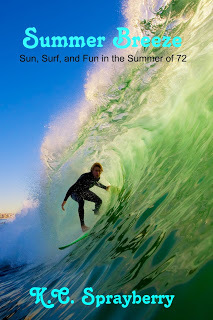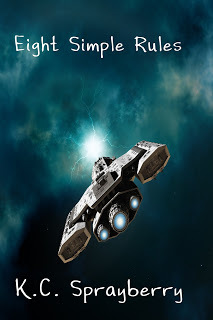K.C. Sprayberry's Blog, page 149
July 11, 2016
Dem Bones
Dem bones, dem bones, just how do we connect dem bones?
We’ve all read great stories. You probably don’t notice what makes the story great, just that it flows from one paragraph to the next. You’re enjoying the book far too much to really think about the mechanics.
Here they go. You have the paragraph bones. Each one is well crafted, honed to the point where the transition is so seamless that you don’t notice when you’re changing from one to another. Many time, while rereading my favorites, I get halfway through the book before I realize life is going on without me.
Your character bones are very important. Characters have to be three dimensional. You have to love or hate them. Even the antagonist needs good qualities. Don’t forget to make your protagonist imperfect. Your hero/heroine will seem more lifelike if you do.
We’re now at the dialogue bones. Very important. Dialogue isn’t the time to describe a person. Don’t talk on and on about how everything looks. Save all that for narrative and keep it short, pertaining to the situation. Your dialogue should be normal conversation, but witty and snappy. Your characters should speak like real people, so the reader can relate to them.
There are other bones you can concentrate on, sub-plots and description. Remember, when creating the bones to your story, make them strong, give them life. Create a tale readers will want to return to time after time, a story they become immersed in.
Published on July 11, 2016 00:00
July 10, 2016
Everybody Reads YA ~ Where U @

Happy “Everybody Reads YA” Sunday! Today I’m sharing an excerpt from my YA novel: Where U @. Texting and driving has become almost commonplace, so much so that many people don’t think about the consequences.

Where U @
The text is from my guy, Dave Woods. It's a code, a way for him to help me feel better about everything. Mostly, it's his way of showing me that he cares.
Kitchen. I roll my eyes. Cleaning.
Want to come do mine?
His return text sends me into a fit of giggles. That's something only he can accomplish.
RFS?
More code, and this one sends fear shivers up and down my spine. I am in no way ready for school, but I'll have to go tomorrow, no matter what.
I text him back, slide my phone into a pocket, and open the door to a floor to ceiling pantry. To put away the last of the dishes, I have to step into a room that is narrower than a shoebox.
The same reaction overtakes me that I experience every single night, as soon as my foot moves through the doorway. Cold sweat rolls down my back. I can't catch my breath, and the walls feel like they're squeezing the life out of me.
About the Author
Born and raised in Southern California’s Los Angeles basin, K.C. Sprayberry spent years traveling the United States and Europe while in the Air Force before settling in northwest Georgia. A new empty nester with her husband of more than twenty years, she spends her days figuring out new ways to torment her characters and coming up with innovative tales from the South and beyond.
She’s a multi-genre author who comes up with ideas from the strangest sources. Some of her short stories have appeared in anthologies, others in magazines.

Trea Jones has always known the bitterness of bigotry and abject poverty. Her half-Cherokee daddy disappeared thirteen years ago on the pretense of getting milk. Mama has done nothing but mourn his loss, and she blames Trea for that. Now that she's starting her senior year of high school, Trea hopes for something better, but she doesn't hold out much hope.Until …
She loosens up on some of her rules. Her guy, Dave, proves to her that she is worthy of everything the others have. The last day of classes prior to the winter break, she's ready to share some stupendous news with Dave, but tragedy intervenes when her daddy texts while driving a bus. Trea is left wondering if she can ever be free of a curse that heaps a lot of bad luck on her whenever good things happen to her.
Where U @
Published on July 10, 2016 00:00
July 6, 2016
A Journey
What makes an author? What kind of journey do we embark on the moment we make the decision to share the stories we’ve been putting into bytes for many years?
For me, the journey began right after the birth of my youngest child. My husband offered me the opportunity to stay at home but also work. He suggested that I follow my dream of becoming a published author.
Let me tell you, the initial acceptance of several short stories gave me more hope than I had bargained for. I was published! My stories were in magazines, being read by teens everywhere. Those were happy days, times when I celebrated the success that came to me early.
Then came the constant rejections. The magazine industry was fading. Those publishers were scaling back on who they accepted. I turned to novels, thinking I’d have the same easy acceptance I did with short stories.
Oh, how wrong I was. For the better part of nearly fifteen years, I’d submit again and again. I’d refine my books, seek out any publisher, and stare in shock at the rejections, if I received one. We were now in the twenty-first century. It wasn’t unusual for a publisher not to respond to a query, if the story didn’t grab them.
Still, I kept submitting. I searched for online publishers, thinking that if the Big 5 or small traditional publishers didn’t want my work, someone else would. Day after day, I’d write for a few hours and then go on the internet, seeking the one publisher who would see what I did in my books.
Even then, that contract offer eluded me. I remember very well the day I decided to give one last publisher a chance—Solstice Publishing. I sent them Softly Say Goodbye and then decided to dive into working on new stories, new tales of teens. For six months, I waited and checked my email more than I should have.
One night in November of 2011, a night my family was sadly thinking about how my husband wouldn’t have a job in six short weeks, I clicked on the email icon. It was more something to do than any urge to see what was there.
To my surprise, there was a letter from Solstice Publishing there. I stared at that little line for many minutes, afraid to open the email and see another rejection. That’s how convinced I was that nothing would go right.
Finally, I did the double click and the email opened. I read the acceptance. Noticed the attached contract—about five times. Then I squealed. Laughed. Hysterically.
My then teenager immediately thought his mom had gone over the edge. All I could do was laugh and cry, pointing at the computer screen. Tears ran down my face. Our son kept yelling at me “What’s the matter?” He hollered for his dad, saying that I’d lost it.
I looked up at my frightened teen and screamed, “I sold a book!”
Those are the exact words I used. His fear vanished in an instant and he was hopping up and down, yelling out the good news. My husband was laughing again. The worse moment of our lives had become a victory, one we will forever cherish.
My journey isn’t over by a long shot. Even now, almost five years later, I have a home with Solstice Publishing. This publisher has given me the confidence to expand my wings, take on subjects that aren’t the typical teen story. And I don’t plan to quit. Ever.
Published on July 06, 2016 00:00
July 5, 2016
Seasonal Stories
A seasonal story can have a longer sales life than just during the season you’re writing about. Tales about winter are especially welcome when the sun heats us to the point of melting away. Drive those shivers of the cold time of year away by reading about fun in the sun.
Summer Breeze is a light tale of two teens finding love on Malibu Beach in 1972. Inspired by the Seals and Croft song of the same name, this story brings for the same elements so many of us from an older generation remember fondly.

Blurb
A special bikini puts courage into Beth to approach the guy of her dreams. Trane looks forward to the waves and talking to a girl who has caught his eye. The Summer of ’72 on the longest day of the year, two teens discover love on the beach, amid adventure and fun.
Excerpt
“Oh, that is so gorgeous!”
Beth Ramsey ignored the tiny, square bedroom lost in the sixties to admire her slim figure in a mirror hanging on her door. The orange bikini she now wore offset her dark tan so well. The tiny gold clasp holding the top on tight might cause problems later, if she didn’t lather up that area with a lot of Swedish Tanning Secret. But she was prepared with not one but three tubes of the lotion that had helped her achieve the healthy glow on her skin.
“I can’t wait until Trane sees me.” She blew a kiss at her reflection and yanked on a pair of short shorts that were nothing more than a pair of her old jeans she’d cut off. A flimsy, see through, white blouse would provide some protection against the wind later, when she returned home from what she planned to be a celebration of the summer solstice on Malibu beach tonight.
Only one thing could mar her happiness, and she planned to avoid that situation at all costs.
Summer Breeze
Published on July 05, 2016 00:00
July 4, 2016
Love Your Publisher
Those authors lucky enough to have a publisher sometimes tend to forget one little thing when giving interviews or promoting our books.
It’s not much, but in the long run this little item can make or break a relationship with your publisher.
Who is this person, or in some cases, several people?
Let me give you a clue. They took a chance on your book, on you as an unknown quantity. They provided you with cover art, an editor, proofreader, and provide you with a comfortable home for your other books.
Yes, I’m talking about your publisher. A publisher doesn’t have to offer an author a contract. It’s not a given that you will be accepted the first time you submit. Even if you put your best foot forward, you won’t always be lucky enough to grab the brass ring and be on track to being published.
The most important way any author can show their publisher love is by mentioning the name of the company that publishes their books. Do this in interviews, whenever you mention your book on social media, even when you’re talking about your book to the person on the street. Say your publisher’s name with pride, because you’ve accomplished a lot just being part of this company.
Don’t be shy. Talk about your publisher. Share those interviews, especially with the publisher. They love this. It not only helps your book but the company itself get better.
Publishers who get love from their authors will often return that love.
Published on July 04, 2016 00:00
July 3, 2016
Everybody Reads YA ~ Who Am I?

Happy “Everybody Reads YA” Sunday! Today I’m sharing an excerpt from my YA novella: Who Am I? We all long to know who we are. Some teens are never really sure.

“A new semester, a new school, and who am I looking at? Sure isn’t me – whoever that is.”
I stare into a mirror in the new house my family moved into last night, and I don’t recognize the person staring back at me.
For as long back as I can remember, I’ve had at least two different names every year – Layla, Helena, Penelope (nicknamed Perky, definitely not me!), and many, many more, far too tedious to mention. At times, I get confused, and I’ve always wondered what my real name is. Where I’m from comes in a very close second. Third is my desire to have a real life, friends, and a future.
Like that will ever happen.
Today begins another life, as another person. The only difference is the size of the town where we are. Instead of a major city, where we can blend in, we’re in a rural Northwest Georgia town, so small everyone has to know everyone else.
About the Author
Born and raised in Southern California’s Los Angeles basin, K.C. Sprayberry spent years traveling the United States and Europe while in the Air Force before settling in northwest Georgia. A new empty nester with her husband of more than twenty years, she spends her days figuring out new ways to torment her characters and coming up with innovative tales from the South and beyond.
She’s a multi-genre author who comes up with ideas from the strangest sources. Some of her short stories have appeared in anthologies, others in magazines.

Brooke English never belongs. She changes schools twice a year, as often as her looks and name change. Her thoughts about belonging to her "family" get even more viral when they stop in Landry, Georgia. Then things start to go wrong. Then Brooke starts to have dreams.
Will she find the answers she wants? Or will her worst fears become reality?
Who Am I?
Published on July 03, 2016 00:00
June 29, 2016
Release Control
Authors are control freaks. We have to be. It has taken us many years to get a publishing contract, even more years not only to write our books but also to hone them to near perfection. Many authors have developed a thick outer skin when it comes to releasing control of any part of our book’s publication process. We justify our actions, our words, by saying that only we are capable of ensuring our book is perfect. We speak to those in charge of the publication process with our publisher in ways we would never think to do with others. Despite the advice of those with far more experience in book publication, we listen to the advice of unheard of bloggers, who have decided they know everything about the publication process, or discussion groups where authors proclaim they know it all and no publisher does.
That these people have no real experience on what it takes to publish a book, other than having one or two published themselves, makes no difference in their advice giving. They are willing to sound like experts, tell you that you have the right to demand your cover art be done by an artist who will draw the images exactly as you want them. They’ll tell you that you can demand that the back cover of your book can have your bio and excerpts from reviews on it, in addition to the book’s blurb. They’ll even go so far as to tell you that your publisher must hire a content editor, in addition to the line editor, plot editor, and/or series editor your book needs in order to ensure it is perfect. Let’s not forget a proofreader who only looks at books in your genre. And then this publisher needs to have a marketing team dedicated to promoting your book, since you’ll be far too busy writing your next great novel to be bothered.
This is the research you’ve done and you’re determined to ensure your publisher follows every single thing you want. You demand, often times coming off as whiny or ill-informed, that you get what you want.
In the end, what to you usually get?
The smart author will realize very quickly that the demands they’re making are only going to alienate them with their publisher. They will quickly become acquainted with what their publisher does for them and accept that as the norm. (It is the norm, believe me.)
The not so smart author will continue making demands, claiming they were tricked into signing a contract that doesn’t provide what they want. Their demands might reach a boiling point, where the publisher and staff offer them a return of their rights. In other words, you will be agreeing to take back your book and find another publisher (good luck there) or self publishing.
What have you lost by alienating a publisher?
It all depends on the publisher. Some will ask in their rights release that you say nothing derogatory about them, and they will give you the same courtesy. Others won’t waste time letting the publishing world know that you are a nightmare work with, and to avoid you at all costs.
As authors, we like to think that we’re in a special field. We don’t play by the rules. We do. There are hard and fast rules to publishing, just as there are hard and fast rules to every job. Those who succeed learn to abide by those rules. Those who have to work harder to achieve their dreams, without the comfort of a publishing house behind them, still believe the rules don’t apply to them.
Published on June 29, 2016 00:00
June 28, 2016
Rules
Rules—we all live by them. A few people claim to know all the rules about their job, kids, or home life, without anyone telling them other ways to set up guidelines for their lives.
There are also those who don’t live by the rules set down by society, or make up their own. Brian Lachlan has decided he has only Eight Simple Ruleshe must master in order to become a ship’s commander. Can he achieve his goal?
Blurb
Brian Lachlan, at thirteen, knows what his future will be. He will be a ship commander, like the skipper of Lucretia’s Dream. On the day when he must prove his skills, in order to be placed in the right training program, he uses the Eight Simple Rules one must know for such a position to compare to his progress.
Will Brian reach his goal?

Excerpt
There are all kinds of rules if you’re going to be the commander of a space liner, exploring the galaxy. Not many of the men and women on Lucretia’s Dream believed in this theory, but they weren’t determined to become the youngest starship commander in history.
According to galactic records, the person currently holding the record was an ancient forty-five when he was awarded command of a garbage scow. But it wasn’t a floating trashcan that interested Brian Lachlan. Oh, no, his master scheme was to take control of the very ship upon which he had been born and raised—Lucretia’s Dream.
I will get the grand prize in this contest. I just have to. That’s the first step to reaching my goal.
Eight Simple Rules
Published on June 28, 2016 00:00
June 27, 2016
Marketing Ploy
As authors, we will do pretty much anything to plug our book, garner interest in our stories. Some of the more outrageous marketing ploys have picked up new fans for us, but in many cases, we could be hurting ourselves rather than helping to gain more sales.
A relatively new ploy is to compare your book to XYZ famous author, promising your readers as good or a better read than a novel that has spent months on the best seller list, has a dedicated fan base, and will usually end up with a movie deal at some point. Some authors will even say their book is a cross between XYZ author’s novel and ABC’s author’s book.
Interesting concept. Some might say it’s a sure fire way to boost your sales.
Why, then, am I wondering just how effective this method of promotion is?
The answer as to why I’m wondering this is simple and comes from a question that keeps bothering me.
Didn’t these people work hard to achieve their fame?
These famous, well known authors gone through the vetting period, just as all authors do. Their books didn’t automatically hit the best seller lists. It took them time and the same thing all of us are doing now—branding their name.
So, when you promise potential readers that they will enjoy a book that is as good as one written by Stephen King, J.K. Rowling, Dan Brown, Tom Clancy, or any other author who has worked hard to have their name recognized, whose books consistently hit the best seller list, what are you assuring these readers?
Will your book grab their interest from the first page? Will the reader recognize the style they’ve come to love and look forward to from famous author XYZ? Are you, as an author with a limited fan base, be able to hold the reader’s interest further than the first few pages of your book?
Why, you say, of course I can do that. My book is fabulous. It’s best seller material.
Good way of thinking, but keep those thoughts to yourself. More traditional methods of marketing your book will find you an audience that appreciates them. Remember this, one day you may be that fabulously sought after author. Do you want people comparing their books to yours, in an attempt to entice your fan base away?
Published on June 27, 2016 00:00
June 26, 2016
Everybody Reads YA ~ The Wrong One

Happy “Everybody Reads YA” Sunday! Today I’m sharing an excerpt from my YA psychological thriller novel: The Wrong One. Child kidnap happens. The Amber Alerts and wanting someone to come back don’t always work.

Four-year-old Lyssa Winders landed with a thump on her living room floor. Her bottom hurt from the hard wood, and her head ached from all the yelling and shouting she’d been hearing. Nothing made sense. She just wanted this to stop.
Her parents, Auntie Keisha, Nana Brandy, and Grandpa Monty kneeled in front of her. They had their hands on the back of their heads, and they looked very scared.
“Gonna talk now, Jack?” the stinky man asked. He had carried her out of the safety of her bedroom and dumped her on the floor. “Or do I hurt your kid?”
Stinky jerked Lyssa to her feet. She couldn’t run. He held her tight in front of his nasty smelling body.
About the Author
Born and raised in Southern California’s Los Angeles basin, K.C. Sprayberry spent years traveling the United States and Europe while in the Air Force before settling in northwest Georgia. A new empty nester with her husband of more than twenty years, she spends her days figuring out new ways to torment her characters and coming up with innovative tales from the South and beyond.
She’s a multi-genre author who comes up with ideas from the strangest sources. Some of her short stories have appeared in anthologies, others in magazines.

One by one, the residents of Landry, Georgia gave up on finding Lyssa Winders alive. It had, after all, been fourteen years since she vanished. The men who invaded her home left behind the bodies of those she loved with all her heart. Only one person never gave up andstill searches for Lyssa. Kyle Tinker battles his own demons from that night, when he hid like a coward instead of running for help. Their eighteenth birthday looms on the horizon, and Kyle is determined to bring Lyssa home.
Meanwhile, Kim Tinker is having trouble understanding her dreams about a pretty blonde girl—she has no idea that these dreams are of her life as Lyssa Winters. She also hears a guy who has recently started talking to her--in her head. All Kim wants is to get away from a family which hates her, but doing it safely is the one thing which eludes her.
On the day of the Freedom Festival, Kyle sees the girl he never thought he'd see again. And Lyssa finds the one person she's protected for the last fourteen years on their shared birthday.
The Wrong One
Published on June 26, 2016 00:00



